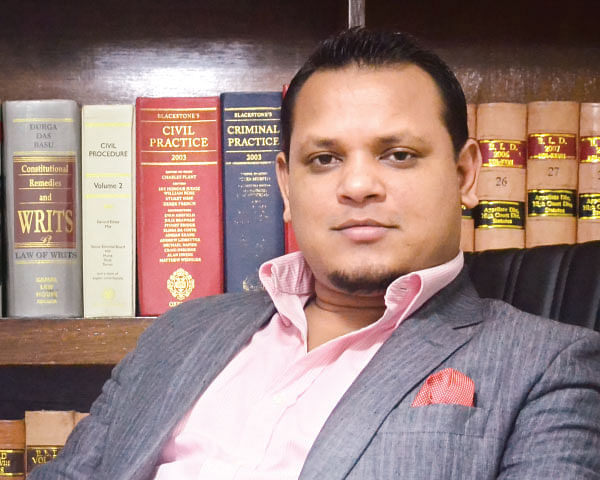Protecting Creativity
Protecting Creativity

Barrister A B M Hamidul Mishbah, the founder of Bangladesh Copyright & Industrial Property Forum (BCIPF) and member of the Anti-Piracy Task Force of Bangladesh, is involved in developing the National Intellectual Property Policy. In this interview with the Star, Mishbah shares his insights on the Intellectual Property rights and the prospect of the IP Policy.
The government is framing the Intellectual Property Policy with the support of World Intellectual Property Organisation. What role can the IP Policy play to promote the economic and trade interests of Bangladesh?
Intellectual Property (IP) is considered as the power tool for economic growth and development in any country. In recent years it has been observed that knowledge and innovation have played an important role in advancement of the economic growth. A robust IP Policy would lay off the platform for millions of Bangladeshis to augment their innovations, creative works and the traditional cultural expressions. The new Policy will ensure protection, maximising commercial benefits to the innovators and creators, which will eventually strengthen our economic growth. WIPO has made a commendable contribution in this regard and we are thankful to WIPO in every means.
Does Bangladesh really need an IP Policy at this stage, and why?
The IP regime is currently taking its momentum in Bangladesh, and at this stage, we observe that various activities are being undertaken from both public and private sectors. This is very encouraging, but it would also warrant that we work together by setting up a common goal and prioritising the action items to reach at a certain stage within a specific period of time. Therefore, this is the right moment to have the IP Policy in place. The IP Policy will ensure better coordination among the various government agencies relevant to this area, galvanise the private sector entities as well as work as a guideline for all across the IP network. The Policy could act as the major instrument to put together all stakeholders and take IP to the next level in Bangladesh.
What do you think are the main challenges for enforcing IPR within Bangladesh?
I would say that lack of IP awareness among the public, stakeholders and government agencies is the main challenge. In addition lack of IP education within the universities, absence of much needed contemporary IP laws to account for new innovations and technological advancement and non-conducive environment for IP enforcement are the other foremost challenges. Government should take initiatives for creating IP awareness. IP is a dynamic area of law, which changes very fast with the technological advancement. Keeping this in view appropriate legal framework needs to be introduced to provide effective means for redressing and reducing IPR infringements. Introducing specialised IP enforcement courts and encourage judges through providing training, establishing anefficient and predictable civil judicial system based on the rule of law would benefit a lot to establish an effective IP regime in Bangladesh.
Many claim that the IPR enforcement will lead to an increase in price for products and services (books, entertainment, and medicine) and will take it beyond affordability for the middle and lower-middle class citizens. What is your view on that claim?
This actually reflects our misconception about IP in Bangladesh. It is very frustrating to see that educated quarters including some intellectuals hold such perception, which is unexpected. Essential life saving drugs are already exempted from IPR protection. In addition we can always take the benefit of the provision of compulsory licensing. Bangladeshi book importers import books, which drives the books price high. They can rather purchase licenses and reprint the books in Bangladesh. This make the book prices more affordable, ensure quality products as well as help the local industry grow.
How do you think will the local industries, i.e. software, indigenous and agricultural industry, be benefited from a strengthened IPR policy?
I observed that the local software makers do not usually negotiate a license when they sell their software to businesses at home or abroad. They however, deprive themselves from benefitting out of the licensing system or technology transfer. Same goes to indigenous and agricultural products, which first needs to be protected and then be transferred diligently to ensure that we can maximise the commercial benefit. In an strengthened IP regime innovators and producers of products are always safeguarded against any possible infringement and are aware of their IP rights and obligations or DOs and DO'NTs
Where does Bangladesh stand in terms of software piracy at the moment and what are the major success stories that you think Bangladesh has achieved over the last few years?
According to a BSA (Business Software Alliance) study, the software piracy in Bangladesh is rated at 87 percent in 2013, which is a 3 percent decline compare to the previous years. It is a matter of encouragement for us. We have made commendable progress in terms of establishing the first ever CMO (Collective Management Organization) for the Music fraternity in Bangladesh. The CMO, once established, will help reduce music piracy and will ensure collection of revenue for the musicians, and this eventually will add value to the exchequer. In addition the general people in cities like Dhaka, especially the youth, have started to realise the importance of IPR protection as well as the consequences of piracy, which is again very inspiring.